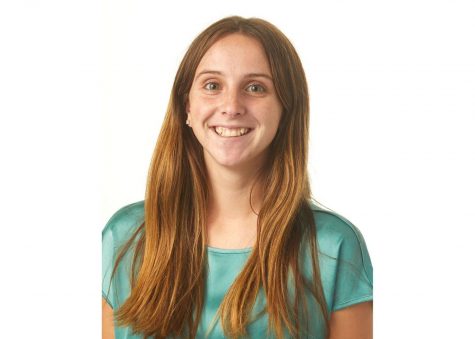Student Association meets with Chancellor Joe Gow and votes on priority registration for student-athletes
October 24, 2021
On Wednesday, Oct. 20, the University of Wisconsin-La Crosse Student Association (SA) invited two guest speakers including Chancellor Joe Gow. SA discussed mental health on campus, COVID-19 restrictions, and updates, as well as diversity and inclusion at UWL. Several students came to the open body forum to express their concerns about activities on campus. SA also discussed the implementation of a policy that allows student-athletes to have priority registration for classes.
The first student to come forward at the open body forum was UWL student Jake Williams. Williams came to voice his concern about the response of UWL to the issue of suicide and mental health issues at UWL. He laid out some action item suggestions for SA to take and try to change the situation. Williams first asked that UWL and SA should formally state and recognize mental health as a priority. His second ask was that UWL “pushes for the end of normalization of suicide on campus”. This was said in response to the recent email sent out by UWL about the student who committed suicide. Williams said that “more action needs to be taken than just a cookie-cutter email.” Lastly, Williams suggested that UWL move to have the Counseling and Testing Center be fully funded. He said, “I have heard from students that there are a lot of barriers to the Counseling Center because of a waitlist or not enough hours for urgent meetings.”
The next student to speak at the open body forum was UWL student Jonathan Idarraga who is the president of the Latin American Student Organization (LASO). He came to discuss the email that was sent out by UWL campus police on October 7th regarding the sexual assault notice. Idarraga said, “There was a backlash from the student body for language that perpetuated victim shaming.” He said that LASO had talked with Campus Chief of Police Allen Hill and that he was “receptive to what was being said and is willing to work with students to rework the language of future emails.” Hill is looking to bring together an informal panel of diverse voices on campus to brainstorm the best language to use moving forward.
The third student to speak at the open body forum was UWL student and captain for the UWL swim and dive team, Jacob Brehmer. Brehmer is also the president of the student-athlete advisory council (SAAC). He came to voice student athletes’ opinions on the passing of a resolution to allow student-athletes to register for classes early. He said, “student-athletes struggle every semester to schedule classes around the rigid practice and game schedules.” UWL is the only UW school in the WIAC that does not allow student-athletes to register earlier than the rest of the student body. This resolution was discussed at greater length later in the meeting.
After the student body open forum, SA welcomed UWL Chancellor Joe Gow as the first guest speaker. Opening his discussion, Chancellor Gow wanted to address the concerns about mental health and suicide response on campus. Chancellor Gow said, “UWL has dedicated, talented, and caring people responding to these situations and so I was disappointed to hear the term cookie cutter.” He expressed the concern and sadness that he feels to hear that a student of UWL would commit suicide. He also said, “I hope everyone is taking care of themselves and that everyone can destress if you can.”
Following the discussion surrounding mental health, Chancellor Gow also gave an update on the COVID-19 response efforts. He discussed the concern of a potential rise in cases after Oktoberfest but reported to be no large spike in cases after the festivities and the positive cases reported had decreased. He also acknowledged the questions being asked by students and outside parties of the campus about when the mask mandate could be lifted. He said, “the classroom remains like an airplane and on airplanes, people are still constantly wearing masks.” Chancellor Gow discussed the increased level and risk of exposure while sitting in a classroom for an extended period, so this mandate will be staying in place. He discussed the possibility of less strict regulations in other settings as cases go down. Chancellor Gow said, “As we see these numbers of positive go down, we will be thinking about how to get back to normal. I am fairly confident that this can happen in this academic year.” Chancellor Gow also discussed access to COVID-19 booster shots and said that the university will make it as easy and accessible to students as soon as its available.
Chancellor Gow also discussed his plans to rename two buildings on campus. He is hoping to rename the Student Union after Lillian B Smith Davenport, who was the first black woman to graduate from UWL. He is also looking to rename the Center for the Arts after Truman Lowe who is a well-known indigenous artist in the La Crosse community. He is looking to make this change to try and honor the diversity on campus. Chancellor Gow said, “I want to tell the history of this university and make it more inclusive and welcoming.”
The second guest speaker to visit SA was the Director of REC Sports Jeff Keenan. He is the new director and has been on campus since July. Since then, he has been working to listen and learn what is important to UWL and its students, specifically within the rec but also on campus. He came to the SA to introduce the changes and goals that are being set in the REC. By Spring of 2022, there will be a renovated outdoor connections space as well as a new e-commerce area. Keenan said, “REC sports can be a player in many different dimensions of wellness.”
SA also discussed the new campus eco-challenge they are taking part in. The eco-challenge is a challenge that allows students to cut down on inefficient or harmful consumption for a limited period. SA is promoting this challenge and the UWL challenge name is “Stryke Out Climate Change”. To be a part of this, you will have to go to the website and sign up. The challenge will run from October 25 to November 15.
SA also passed a resolution in support of allowing student-athletes to have priority registration for classes. The resolution would allow student-athletes to have ahead of class registration opportunities to help accommodate their academic and athletic schedules. According to Athletic Senator Kat Fitzgerald, UWL is one of two schools in the UW system that does not have this policy in place. Senator Kate Lochner said, “it will have a very small impact on the rest of the student body.” She said this referring to the data brought up that student-athletes at UWL only make up 8% of the student body. There was a lot of debate on the equality of this policy. Many senators mentioned concerns about fairness for other groups such as individuals in the arts. Senator Morgan Hose said, “band and choir students have the same concern as that being an extracurricular group.” In response to this, Senator Fitzgerald said that she had originally looked to include these groups of students but when she asked individuals they did not express as much of a need to her. Senators also discussed the negative impacts that not having this policy could have on UWL. Senator Lochner brought up an incident where she met with a father and son that was being recruited to play baseball at UWL and they had discussed attending another school because UWL did not already have a policy in place that helped student-athletes balance school and sports. In response to this story Senator Ryan Sperling said, “if we are actually losing students because we do not have this, this is not only damaging to the current student-athletes but also to the potential future athletes.”
SA debated this policy at length, trying to decide whether to pass the resolution. In the end, the resolution was voted on and passed with contention, a majority of senators voting for the resolution with a few voting against it. The policy still needs to go through at least three more levels of analysis and approval before it can be put in place.







